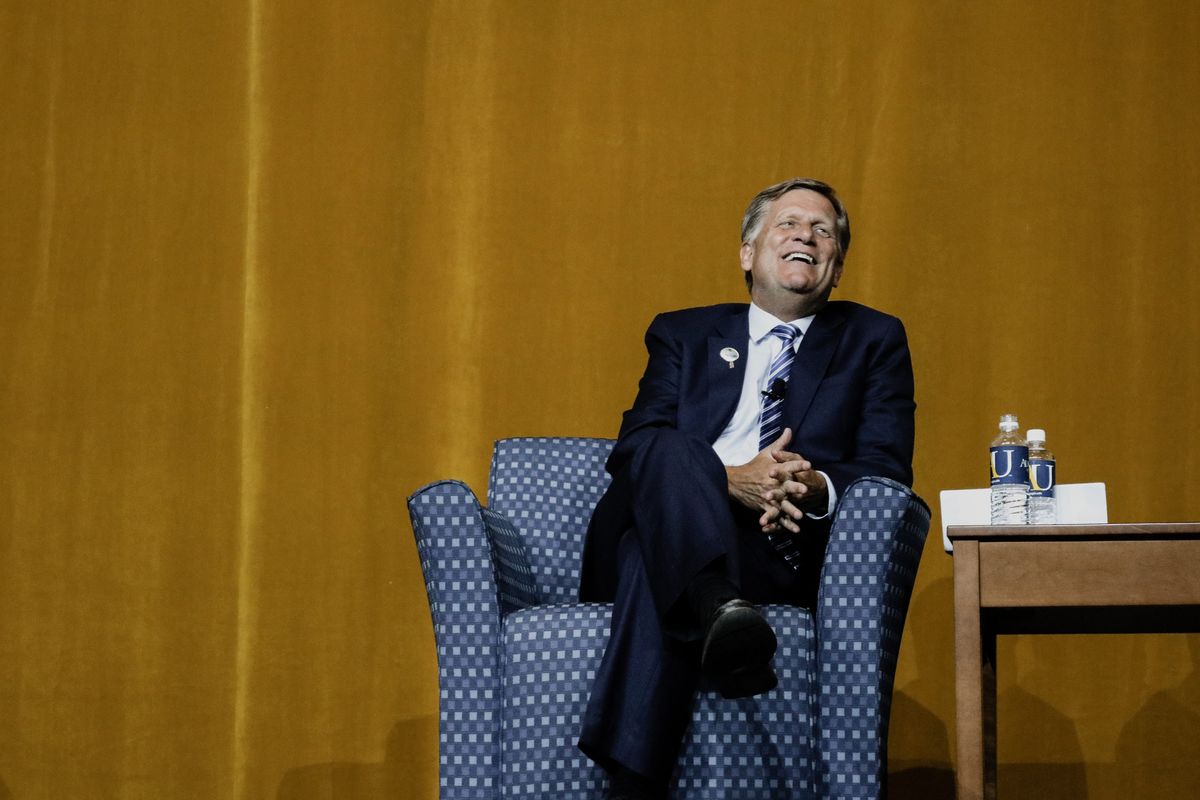Speaker talks ‘Putinism’ and democratization at 25th annual Boe Forum

Amid Russian President Vladimir Putin’s invasion of Ukraine, the Center for Western Studies brought former U.S. ambassador to the Russian Federation Michael McFaul to campus as the speaker of the 25th Boe Forum on Public Affairs.
In addition to having served as the ambassador to Russia from 2012-2014, McFaul is currently a political science professor at Stanford University. He has also written a book on the topic of Russian relations and has appeared frequently on national media broadcasts. McFaul said he is in the process of writing and publishing another book.
According to CWS executive director Harry Thompson, the Boe Forum committee had been planning on bringing a speaker related to international affairs to campus and chose McFaul as tensions in Ukraine rose.
“When the invasion of Ukraine seemed imminent, the Boe Committee acted quickly to bring a speaker with first-hand knowledge of the subject matter, a requirement of the forum, to the campus,” Thompson said.
The forum, titled “Russia and the Future of Europe,” focused on the historical causes of Russian conflict with both Eastern Europe and the U.S., the reality of the current situation in Ukraine, what the future could look like and how Americans are both affected by and should play a role in the situation.
McFaul began his presentation by describing some of the main causes behind conflict in Eastern Europe. McFaul said the biggest catalyst has been Russia’s domestic politics, specifically the political ideology of Putin, which he called “Putinism.”
McFaul said that Putin’s ideology has become increasingly autocratic since becoming president, which has conflicted with Eastern Europe’s shift toward democratic governments. According to McFaul, Putin has said that one of his biggest grievances against the U.S. is that the country, in his eyes, has sponsored regime changes in Russia’s sphere of influence.
After laying out the causes behind tensions in Russia and Eastern Europe, McFaul moved on to analyzing the present situation. While many people underestimated the strength of Ukraine and overestimated that of Russia, McFaul said he fears that “there’s more war to happen.”
McFaul then shifted his focus to the future, talking about both the war as well as Russian relations in general.
While discussing what effects the war will have going forward, McFaul said he thinks the invasion of Ukraine marks “the beginning of the end” for Putin and his ideology, predicting that Putin will lose his remaining support and that future politicians won’t be as autocratic.
McFaul ended his speech by looking at how the situation in Eastern Europe affects the United States and the lives of Americans. He said the U.S. needs to overcome its polarization and unite, as it’s the country’s duty to help Ukraine and its democracy.
“I’m absolutely convinced that the Ukranians will win, and therefore, our job is to make sure it’s faster and less painful,” McFaul said.
After McFaul finished his talk, President Stephanie Herseth Sandlin joined him to answer questions submitted by Augustana government students.
The questions, which were asked by Augustana Student Association President Courtney Chrystal and junior senator Henry Van Bemmel, touched on the role faith has played in McFaul’s political career, the importance of history in political science and whether ‘nation building’ is a successful strategy to get countries to move toward democracy.

Responding to the question on nation building, McFaul said that the U.S. has historically associated the fall of autocracy in a country with the rise of democracy, which hasn’t often been the case.
Van Bemmel said he appreciated the focus McFaul gave to the historical causes that have led up to the current situation.
“I really liked what he talked about, what he put forward as his primary cause, which was this Putinism and the fear of democracy or democratization,” Van Bemmel said.
Chrystal said she enjoyed the section for questions, as it offered more solutions compared to McFaul’s initial speech.
“What I wanted from the talk was real implications,” Chrystal said. “His answers felt more instructional.”
After the forum, Junior Cal Irvine said he noted McFaul’s “transparency, opinions, and bold predictions,” which he said were central to the speech.
Prior to the forum, McFaul also attended other events on campus. He spoke to government and international affairs majors earlier in the day, and after that, he held a press conference with journalism students from Augustana and local high schools followed by a reception that led to the forum.
SEE NEXT: Green, Metzel present on genetic engineering at Boe Forum
Olivia Bertino contributed to this report.



